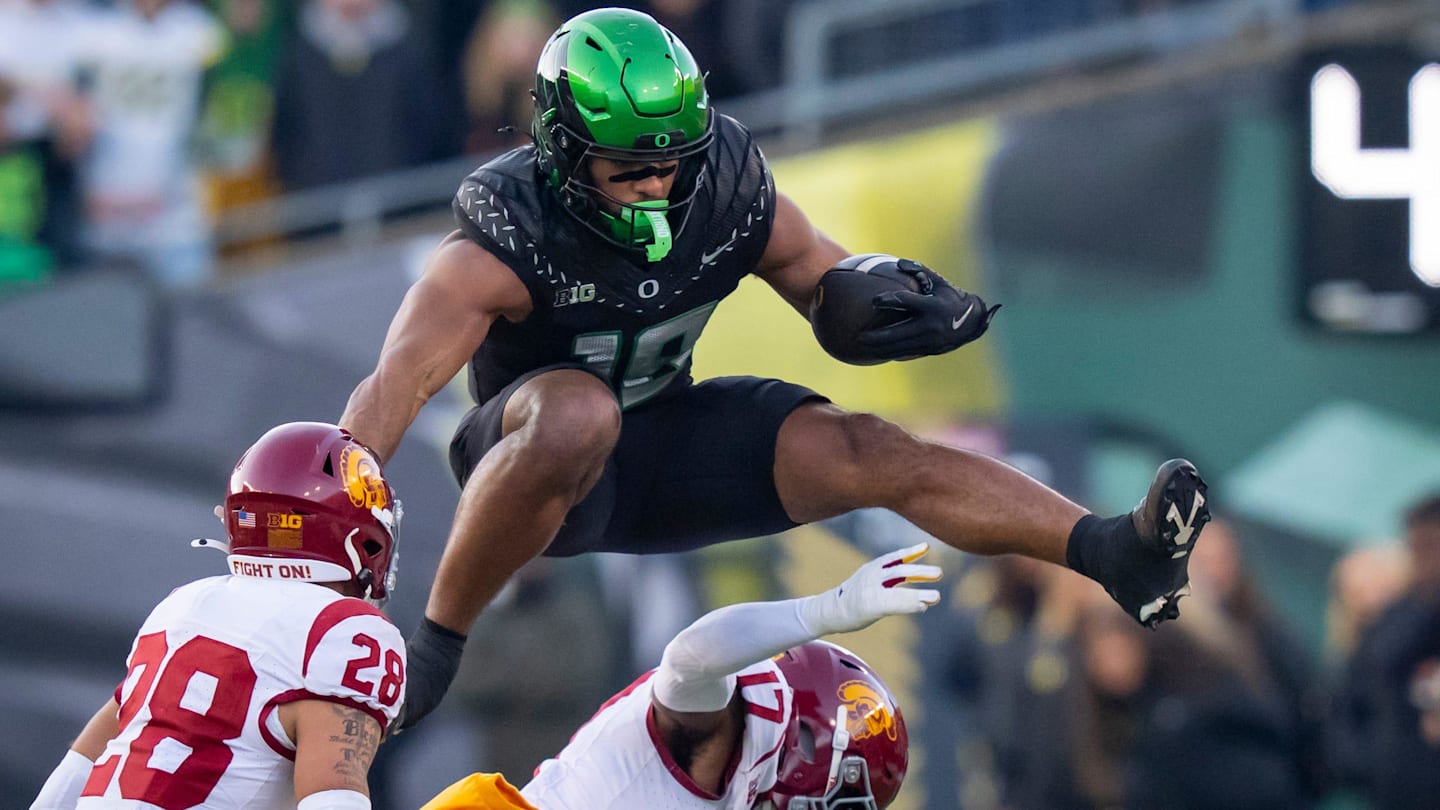The 25 Best College Football Quarterbacks of the Past 25 Years

Introduction
College football has seen some incredible quarterbacks over the past 25 years, and Sports Illustrated has compiled a list of the 25 best. Sitting atop that list is Joe Burrow, who had a record-breaking season for LSU in 2019 and went on to win the Heisman Trophy and a national championship. But he is just one of many decorated quarterbacks on this list, each with their own unique achievements and legacies.
Notable Names
While Joe Burrow may hold the top spot, he is joined by some other notable names on this list. There's Tim Tebow, who became the first sophomore to win the Heisman Trophy in 2007 and led Florida to two national titles. Then there's Marcus Mariota, who won the Heisman in 2014 and led Oregon to the national championship game. And let's not forget about Jameis Winston, the youngest player to win the Heisman in 2013 and the first quarterback to lead Florida State to a national title since 1999.
Legacy and Impact
These quarterbacks have not only left their mark on the record books, but also on the game of college football as a whole. They have inspired future generations of players and set the bar high for future quarterbacks to strive for. Their legacies will be remembered for years to come, and their impact on the sport is
About the Organizations Mentioned
Sports Illustrated
**Sports Illustrated (SI)** is a pioneering American sports magazine launched in August 1954 by Time Inc. founder Henry Luce, initially a risky venture into dedicated sports journalism at a time when sports coverage was considered trivial[1][4][8]. The magazine debuted with a baseball-themed cover and struggled financially for its first 12 years, but transformed under managing editor Andre Laguerre starting in 1960, who introduced innovations such as full-color photography and redesigned layouts, doubling circulation and boosting advertising revenue from $12 million to $72 million by the mid-1970s[2][3][6]. SI became renowned for its high-quality sports reporting, combining in-depth storytelling with striking photography, setting a new standard for sports journalism and influencing the entire industry[5]. It was the first full-color weekly magazine in 1983, leveraging advanced printing technologies, and won the National Magazine Award for General Excellence twice—an unprecedented achievement for a sports magazine[1][4]. One of SI’s most notable and culturally impactful initiatives is its annual **Swimsuit Issue**, launched in 1964 by Laguerre. This issue became a major commercial success and pop culture event, widely recognized beyond the sports world for its photography and celebrity models[2][3][8]. Ownership of Sports Illustrated has changed multiple times. Originally part of Time Inc., it was sold to Authentic Brands Group (ABG) in 2018. Editorial operations were licensed to The Arena Group until early 2024, when licensing issues led to editorial staff layoffs. In March 2024, publishing rights were licensed to Minute Media, which planned to revive both print and digital editions, though in May 2024 the magazine missed delivering a print issue for the first time in its 70-year history, signaling ongoing challenges in the digital age[1]. Despite recent struggles, SI remains a symbol of innovative sports journalism and multimedia branding, known for blending sports culture with business and technology advancements in magazine publishing.
LSU
Louisiana State University (LSU) is a prominent public research university located in Baton Rouge, Louisiana, known for its comprehensive academic programs, cutting-edge research, and vibrant campus life. Established as a flagship institution, LSU offers a student-centered learning environment with a 20:1 student-faculty ratio, emphasizing critical thinking, practical skills, and ethical leadership[1]. It is a midsize city campus that actively engages in community involvement and fosters personal development among its students. LSU has a rich history of growth and innovation. The university is expanding its infrastructure with state-of-the-art facilities, such as the nearly 200,000-square-foot Our Lady of the Lake Health Interdisciplinary Science Building, aimed at enhancing academics, research, and industry collaboration. Additionally, new residence halls are being constructed to accommodate increasing enrollment, reflecting LSU’s commitment to providing an inclusive and modern educational environment[2]. In the realm of business and technology, LSU’s E. J. Ourso College of Business is particularly noteworthy. It has experienced a 37% enrollment increase, conferring over 1,000 bachelor's degrees in the 2024-2025 academic year, with graduates achieving an average starting salary of $76,289. The college’s popular majors include general business, finance, marketing, and business analytics[4]. The college actively recognizes outstanding alumni through its Hall of Distinction, reinforcing a strong network of accomplished professionals[5]. LSU is also a national leader in artificial intelligence and cybersecurity, securing a $25 million federal contract to develop AI tools for nuclear threat defense and partnering with Idaho National Lab to advance cybersecurity in the energy sector[2]. Its organizational structure supports diverse areas such as innovation, research, and enterprise development, led by experienced vice presidents and officers[3]. Beyond academics, LSU offers a dynamic campus life with over 400 student organizations, fostering leadership, professional development, and community service opportunities[6][7]. LSU’s commitment to innovation, academic excellenc
Florida
The term "Florida" in the context of your query most likely refers to the U.S. state government of Florida, as no specific private or non-governmental organization named "Florida" appears in the search results. The **State of Florida** is a major governmental entity responsible for legislating, budgeting, and administering public policies that affect over 21 million residents. Its operations span executive, legislative, and judicial branches, with numerous departments managing sectors such as health, education, environment, and commerce[6]. The state government’s recent major activity includes the signing of the **Fiscal Year (FY) 2025–2026 budget by Governor Ron DeSantis**, totaling approximately $117.4 billion after vetoes. This budget reflects a commitment to fiscal responsibility, marking the second year of year-over-year state spending reductions, with a maintained reserve of $15.7 billion and a record-high Budget Stabilization Fund of $4.9 billion, tripled since Governor DeSantis took office. The budget also includes an $830 million accelerated debt repayment program aimed at retiring nearly half of Florida’s tax-supported debt accrued since statehood[1][3][7][9]. The Florida Legislature convenes annually for sessions where it debates and passes laws affecting diverse areas like voting rights, education, transportation, and environmental regulation. The 2025 legislative session, for example, included bills on transportation planning, land acquisition regulations, and climate-related policies, reflecting the state’s balance between economic development and resource management[2][4][8]. Notable aspects of Florida’s governance include a robust system for managing public funds and debt, strategic legislative processes impacting business and technology sectors, and a focus on maintaining freedoms alongside economic growth. The Department of Economic Opportunity was renamed the Department of Commerce in 2023, emphasizing the state’s drive to support business development[6]. Overall, Florida as a state organization plays a critical role in shaping economic, social, and technological landscapes in a wa
Oregon
The term "Oregon" primarily refers to the U.S. state government and its related institutions rather than a single private organization. The **Oregon state government** oversees a wide range of public services including transportation, education, human services, and economic development. Its agencies manage significant budgets and legislative priorities affecting millions of residents. In 2025, Oregon's government focused heavily on transportation infrastructure, housing expansion, behavioral health, education accountability, and wildfire combat funding, reflecting Governor Tina Kotek’s legislative priorities[1][3][4]. The Oregon Department of Transportation (ODOT) played a crucial role in advancing major infrastructure projects such as the Interstate Bridge Replacement Project, supported by specific legislative changes in 2025[1]. The state legislature passed 640 bills in 2025, impacting various sectors including transportation and higher education[1][3]. Oregon's budget for the 2025-27 biennium totals approximately $138.9 billion, a 6.3% increase from the previous cycle, highlighting the state's growing investment in public services[2]. This includes $37.3 billion from the General Fund, $1.8 billion from Lottery funds, and $43.7 billion in federal funds[2]. However, funding challenges remain, especially in higher education, where public universities received less than requested for operating support, increasing pressure on tuition and institutional budgets[3]. Oregon’s research and educational institutions, such as Oregon State University, are deeply intertwined with federal funding, which comprises more than three-fourths of their sponsored activities. The 2025 federal government shutdown posed risks to ongoing research projects and educational programs, although short-term impacts were manageable[5]. Notably, Oregon’s state government continues to emphasize sustainability, public safety, and economic resilience through comprehensive legislative and budgetary measures, positioning the state as a significant player in public sector innovation and infrastructure development in the Pacific Northwest. In summary, **Oregon as an organization** is best understood as a complex
Florida State
The term "Florida State" can refer to several organizations, but it most commonly relates to **Florida State University (FSU)** and the **State of Florida** itself. Here's a summary focusing on both: ## Florida State University (FSU) **Overview**: FSU is a public research university located in Tallahassee, Florida. It was founded in 1851 and is one of the oldest institutions of higher learning in the state. **What it does**: FSU offers a wide range of undergraduate and graduate programs across various fields, including business, technology, arts, and sciences. It is known for its strong programs in engineering, business, and the arts. **History**: FSU has a rich history, evolving from a small college to a major research institution. It has been recognized for its contributions to education and research. **Key achievements**: FSU is recognized for its research in fields like engineering and business. It has also been ranked among the top public universities in the U.S. ## State of Florida **Overview**: The State of Florida is a major U.S. state known for its diverse economy, including tourism, agriculture, and technology sectors. **What it does**: The state government manages various sectors, including education, healthcare, and environmental protection. It is also a hub for business and technology startups. **History**: Florida became a state in 1845 and has grown significantly since then, becoming a leader in tourism and technology. **Key achievements**: Florida is a leader in space exploration, with NASA's Kennedy Space Center located there. It also hosts major tech and business events, fostering innovation and entrepreneurship. **Notable aspects**: Both FSU and the State of Florida are known for their contributions to education, research, and economic growth. FSU's research efforts and the state's business-friendly environment make them significant players in the U.S. business and technology landscape.












